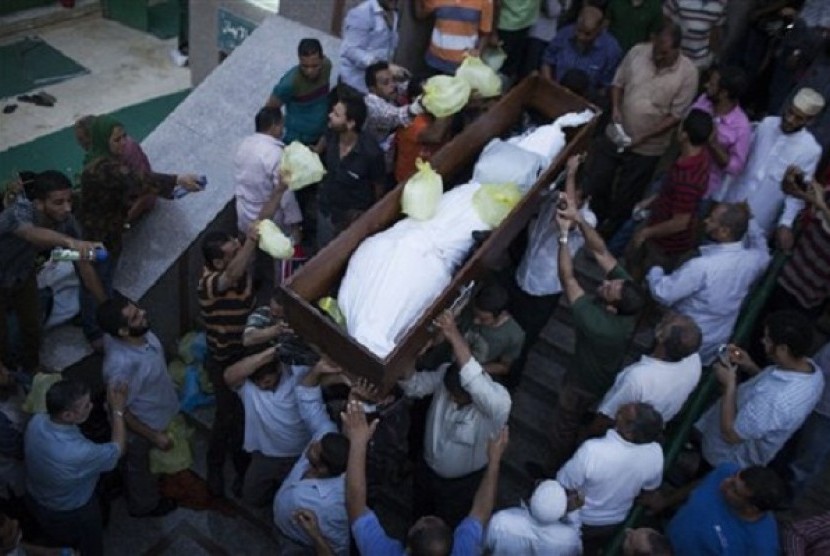REPUBLIKA.CO.ID, CAIRO - Weeping relatives in search of loved ones uncovered the faces of the bloodied, unclaimed dead in a Cairo mosque near the smoldering epicenter of support for ousted President Mohammed Mursi, as the death toll soared past 600 Thursday from Egypt's deadliest day since the Arab Spring began.
World condemnation widened for the bloody crackdown on Mursi's mostly Islamist supporters, including an angry response from President Barack Obama, who canceled joint US-Egyptian military maneuvers.
Violence spread Thursday, with government buildings set afire near the pyramids, policemen gunned down and scores of Christian churches attacked. As turmoil engulfed the country, the Interior Ministry authorized the use of deadly force against protesters targeting police and state institutions.
The Muslim Brotherhood, trying to regroup after the assault on their encampments and the arrest of many of their leaders, called for a mass rally on Friday in a challenge to the government's declaration of a monthlong state of emergency and a dusk-to-dawn curfew.
At least 638 people were confirmed killed and nearly 4,000 wounded in the violence sparked when riot police backed by armored vehicles, snipers and bulldozers smashed the two sit-ins in Cairo where Morsi's supporters had been camped out for six weeks to demand his reinstatement. It was the deadliest day by far since the 2011 popular uprising that overthrew autocratic ruler Hosni Mubarak and plunged the country into more than two years of instability.
Bodies are getting decomposed
Inside the mosque-turned-morgue, the names of the dead were scribbled on white sheets covering the bodies, some of them charred, and a list with 265 names was plastered on the wall. Heat made the stench from the corpses almost unbearable as the ice brought in to chill the bodies melted and household fans offered little relief.
Weeping relatives filled the mosque courtyard and spilled into the streets. In a corner, a woman cradled the head of a slain man in her lap, fanning it with a paper fan. Nearby, an anguished man shouted, "God take revenge on you el-Sissi!" a reference to the powerful military chief, Gen. Abdel-Fatah el-Sissi.
Slumped over the body of his brother, Ihab el-Sayyed said the 24-year-old was getting ready for his wedding next week. "Last time I heard his voice was an hour or two before I heard of his death," he said, choking back tears.
Over the mosque speakers, announcements urged people to leave because their body heat was making the humid conditions worse inside the mosque, where posters of Mursi lay piled up in a corner.
Many people complained that authorities were preventing them from obtaining permits to bury their dead, although the Muslim Brotherhood announced that several funerals had been held Thursday. Fathallah denied that permits were being withheld.
"Bodies are getting decomposed. We only want to bury them. This is unfair," said Hamdan Abdullah, who had traveled from the city of Fayoum to retrieve the body of his niece.


